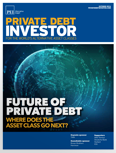
October 2016 Issue
Infrastructure and renewables investing in India
Transport projects are proving a far from easy ride for investors in Indian infrastructure, but renewable energy could offer a better alternative.
The Last Word: Capzanine flies under the radar
Laurent Benard, managing partner of French fund manager Capzanine, explains why he is happy about the lack of headlines surrounding French private debt.
Keynote Interview: EQT calls on experience
Supported by a large network of industrial advisors, EQT Credit brings added value to its three strategies. Andrew Konopelski, Cyril Tergiman and Paul Johnson, at investment advisor EQT Partners, explain more about the firm’s approach to the market.
Expert comment: IFM on picking and choosing
IFM Investors caters to a wide range of different risk/return expectations. We find out how this feeds into the firm’s strategy from its senior executives Rich Randall and David Cooper.
Expert comment: IAM on outpacing equity
In Canada, the mid-market infrastructure debt opportunity appears the most compelling investment option. Philip Robson and Theresa Shutt, president and CIO respectively at IAM Private Debt Group, explain the dynamics.
Future of private debt: Different shapes and sizes
Direct lending, bigger commitments and niche strategies. From customised funds to wedding finance, PDI outlines some of the key developments in the growth of an asset class.
Future of private debt: Why the universe is expanding
Regulatory pressure on banks, increasing sophistication within the LP base and a growing appetite for non-bank finance from companies not sponsored by private equity firms are among the reasons why private debt appears to have a promising future. A select group met to discuss the evolution of the asset class.
Future of private debt: Regulation in Europe
With the banks squeezed by regulators, governments are waking up to the attractions of alternative lenders. But that doesn’t mean it’s going to be easy for private debt managers.
Future of private debt: The big 'what ifs'
President Trump? $100 oil? PDI looks at three hypothetical scenarios and wonder how they might have an impact on private debt.
Future of private debt: The new face of real estate lending
Alternative lenders have muscled into traditional banking territory in the real estate sector. But will they stand up to scrutiny when a downturn comes?
Future of private debt: LendInvest on UK housing
Development finance businesses will have a crucial role in digging the UK out of its housing difficulties.
Future of private debt: The last word with ADM
Christopher Botsford, founding partner and joint chief investment officer at ADM Capital, talks about how the private debt opportunity is unfolding in Asia.
Future of private debt: TIAA's ever-expanding universe
From their view across the private credit spectrum, four senior executives at TIAA describe how the market has changed and how it is further evolving in response to investor needs.
Future of private debt: Alter Domus on regulation
As the private debt sector continues its move from the sidelines to an established asset class in its own right, Maximilien Dambax of Alter Domus examines the challenges the industry may face as the EU looks at existing local regulatory practices to assess the case for a potential future EU framework.
Future of private debt: ICG on flexibility and diversification
Multi-strategy alternative credit investing can provide investors with diversification, good returns and efficiency. Benoît Durteste of ICG explains how.
Future of private debt: Deutsche Bank on tailoring to all needs
Deutsche Bank’s Global Transaction Banking often finds itself lending a hand to smaller and less experienced asset managers.
Future of private debt: Harbert on seeking the right funds
As the number of private debt funds entering the market increases, many are increasingly looking at more specialised strategies. Harbert explains why its long track record of investing in European high-growth companies and the US mid-Atlantic gives it the edge.






 Special Edition
Special Edition